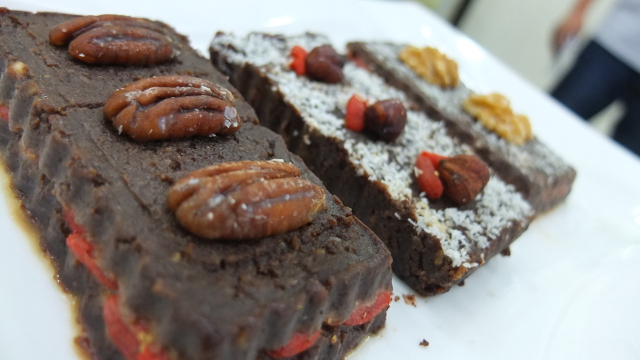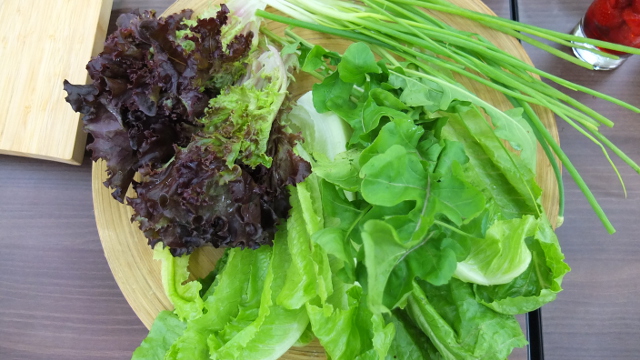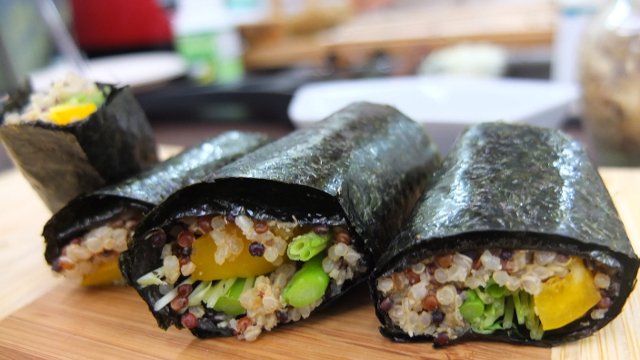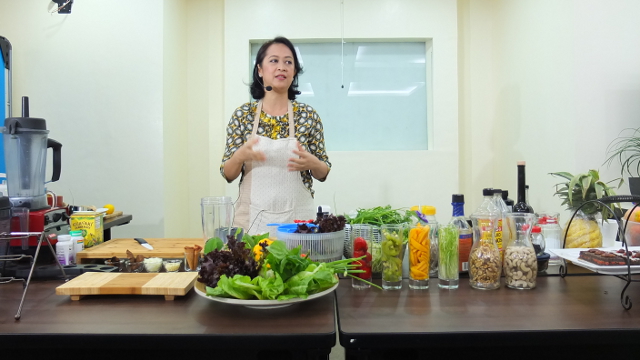SUMMARY
This is AI generated summarization, which may have errors. For context, always refer to the full article.

MANILA, Philippines – Eating healthy, going green and buying organic have become a popular lifestyle choice for many newly-converted health buffs.
The rise of the “green movement” has led to the sprouting of weekend markets in the city, frequented by heads of household who want healthier and less chemically-contaminated food on their table. Stalls in the market proclaim their food to be “organic,” but weekend shoppers should beware.
Aileen de Guzman, raw food chef and health advocate, warns: “A lot of weekend market vendors only say they sell ‘organic’ when in fact, their produce is conventionally farmed, meaning they make use of chemical fertilizers and pesticides.”
Genuine organic food means only natural substances have gone into the product. For fruits and vegetables, only natural fertilizers have been used. Organic poultry and meat are made from chicken, cows or pigs that have been fed only natural feeds and have not been injected with hormones.
These conditions are what make organic food expensive. Without chemical fertilizers, fruits and vegetables take longer to grow and the yield is not as much as if they were spurred by chemicals. Organic fruits and veggies can only be harvested when they are seasonal, as compared to their chemical-helped counterparts that grow all year round.
What then is the benefit of organic food?
“You can get more nutrients from them. They taste better and don’t introduce unnatural substances into your body,” says Aileen.
Certified organic

But telling an all-organic strawberry apart from the multitudes of “fake organic” ones can be challenging for the uninformed. That’s what the Organic Certification Center of the Philippines is for.
The OCCP is an organization that assesses organic food harvesters and sellers to ensure they aren’t fooling consumers. They inspect plantations to ensure the entire process — from planting the seeds to harvesting the fruits and vegetables — is chemical-free and eco-friendly.
In farms, they ensure the same thing for poultry, beef and pork.
This is what they call “organic farming” which, according to OCCP standards, is a farming system “based on the dynamic interaction between the soil, plants, animals, humans and the environment. It relies largely on locally available resources.”
To be certified by the OCCP, a farm must meet requirements in crop rotation, manure management, soil conversion, water management, livestock management and pest management, among other processes involved in maintaining a farm.
See the entire OCCP Standards document here.
To know if your favorite organic food vendor is truly selling organic, you can ask them to show you their OCCP seal or certification.
There is also a list of certified organic farmers on the OCCP website.
Going raw

But the use of pesticides and chemical fertilizers isn’t the only process that can contaminate food and reduce the nutrients you can get from them. Using artificial preservatives in food does the same thing, which is why Aileen recommends going raw.
She says that in raw food “macro and micronutrients like protein, carbohydrates, fats, vitamins and minerals are complete, eliminating the need for supplements.”
Though raw foodism hasn’t achieved the same popularity as vegetarianism in the Philippines, raw food chefs like Aileen aim to convert more and more people.
“When you say diet, you think it’s something restricting. You cannot eat this, you cannot eat that. Actually, living healthily and eating a balanced diet rich in nutrients isn’t necessarily avoiding meat because protein is very important.”
And while most people will shudder at the thought of eating raw meat, Aileen believes there are ways to make them delicious and appetizing, hence her raw food workshops under organic food store and restaurant Sugarleaf.
The series of workshops dubbed “Let Food be Your Medicine” are meant to introduce participants to the concept of raw foodism and eating healthy. A specially-prepared raw food menu will serve as the centerpiece of each workshop. Participants can then watch Aileen prepare each item on the menu and explain the recipes.
Here is the workshop schedule:
- February 23, 2013 – Introduction to super foods and super herbs (Thai-inspired menu)
- March 30 – Super herbs for cleansing (Japanese-inspired menu)
- April 27 – Detoxifying with herbs and fermented foods (Korean-inspired menu)
- May 25 – Introducing medicinal herbs with dehydration (Italian-inspired menu)
- June 29 – Tonic herbs with super foods fusion

Among the exotic raw food fare to be prepared by Aileen are Quinoa sushi, seaweed astragalus salad, chocolate vanilla biscotti, Chaga “cappuccino” coffee alternative and mushroom “bulgogi” in lettuce wrap.
The hefty session fee of Php 2,000 per person covers all the prepared dishes which all participants will get to taste. Senior citizens, pairs, couples, groups and students get a Php 200 discount per person. Those who attend 3 workshops get the 4th for free.
All sessions will be held at the MEDICard Lifestyle Center located at 51 Paseo de Roxas cor. Sen. Gil Puyat Avenue, Urdaneta Village, Makati City. To sign up for the workshops or inquire about them, you can send an email to angelo@sugarleafph.com.
For many of us, going raw and even taking the extra step to buying genuinely organic food may be unfamiliar territory.
But like most strange delicacies, they may well be worth a try. – Rappler.com
Add a comment
How does this make you feel?
There are no comments yet. Add your comment to start the conversation.